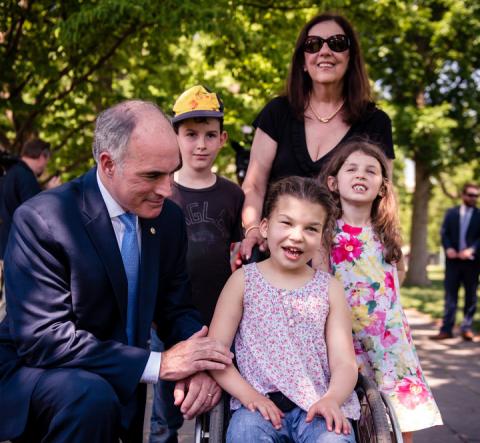
When a child is born ill or with disabilities, there is love, but there is also fear. Fear of what will happen during the endless medical procedures, what kind life the child might live, how life will be different than what was imagined and fear of paying for it all.
When my daughter Claire was born almost 11 years ago, her health and future were uncertain. Born with a rare genetic disorder that affects nearly every part of her body, Claire spent time in the neo-natal intensive care unit, had heart surgery when she was 4 months old, and endured test after test after test to figure out the extent of the impact of her extra genetic material would have on her health and development. These tests determined she was missing part of her brain, that she suffered from pulmonary hypertension, that she had hearing loss, that she was likely to suffer seizures, that she would be lucky to one day recognize simple symbols, and on and on.
Before Claire was a month old, we started calling her the Million Dollar Baby, since her medical bills were already so high. Yet with a secure job at the federal government and a good insurance plan, I hadn’t yet started to worry about the exorbitant cost of caring for a child with significant needs.
That changed quickly. Although I had dutifully gotten on several waitlists for daycare centers when I was pregnant, none were able to take on the task of caring for Claire. In any event, I realized that I would not be able to both work and take Claire to the 5-10 appointments she had per week. My request to work part time was denied, and so I lost my job ― and with it my employer-subsidized health insurance.
Fear set in. My husband had insurance through his employer, but they did not offer family benefits, and we were faced with living on one income, spending upward of $1,000 a month for an insurance plan with higher co-pays and less coverage. With only one working parent, more fear set in about what would happen with an un-insurable child if my husband were to ever lose his job or his employer decided to stop allowing family members on their plan at all.
When Claire was about 2, I was invited to a lobby day on Capitol Hill to discuss our story with the staff of Republican Congressman actively opposed to ObamaCare. I posed the question of how Claire would get health insurance if my husband ever lost his job since no private plan would cover her at any cost. Their answer, which still seems bizarre to me, was that surely doctors would have sympathy and offer their services for free.
My husband and I joked that one day we would travel from doctor’s office to doctor’s office asking, “Please sir, can you spare a bypass surgery?” Our fear ran so deep we had nothing left to do but laugh as we imagined a future in which our daughter lacked any dignity and literally begged for life-saving treatment. Other suggestions were to “spend down” our few assets and have my husband quit his job so that my entire family lived at the poverty line as a path to getting Claire Medicaid. Or, we could declare medical bankruptcy.
Around the time Claire turned 4, with a growing list of needs, our fears lifted somewhat after Claire was found eligible for Medicaid under a Katie Beckett waiver, a program Ronald Reagan started to help children with significant disabilities. Medicaid provided not just reassurance that Claire would always have insurance, but that she would also have access to the treatments and medical equipment her doctor thought she needed regardless of what our private insurance covered, like her wheelchair. Under Medicaid, Claire got the hearing aid her private insurance had rejected. She got an adaptive stroller to help her get around. She got a bed she would not fall out of at night.
Claire’s Medicaid benefits also help her to receive an education by providing her with special education services at school as well as the therapies she needs to help her access her school’s curriculum and activities. Under Medicaid, Claire also receives support she needs to be able to stay at home, including one-to-one supervision during her waking hours.

Claire’s prognosis is not one any parent wants for their child. She is almost 11 and cannot speak or safely walk on her own. She wears diapers. Her progress is measured by how many times she seems to respond to her name or whether she can independently place two pieces in Mr. Potato Head by herself. While we celebrate her victories, the nature of her success also makes it clear that she will need significant support throughout her lifetime and as the physical demands of caring for her increase.
With the threat of TrumpCare looming large, we are more afraid than ever. The safeguards of ObamaCare are at risk, but so are the Medicaid benefits that impact nearly every aspect of her life from education, to home life, to medical care to medical equipment. It has been years since anyone made the suggestion to me that my family spend down our assets and that we quit our jobs to help ensure Claire had access to necessary medical care, but since TrumpCare has been in the news this is a phrase I am hearing again.
Claire and our family recently joined one of TrumpCare’s most vocal opponents, Pennsylvania Senator Bob Casey, for a press conference about the significant threats posed to children by proposed cuts to Medicaid. After the press conference, Claire’s grandmother asked one of his legislative assistants what would happen to Claire if TrumpCare became a reality.
“We don’t know,” he said, and encouraged us to fight with all we had.
For all of the families who are afraid, please fight. With all you have.



The views and opinions expressed in this post are those of the author(s) and do not necessarily reflect those of MomsRising.org.
MomsRising.org strongly encourages our readers to post comments in response to blog posts. We value diversity of opinions and perspectives. Our goals for this space are to be educational, thought-provoking, and respectful. So we actively moderate comments and we reserve the right to edit or remove comments that undermine these goals. Thanks!